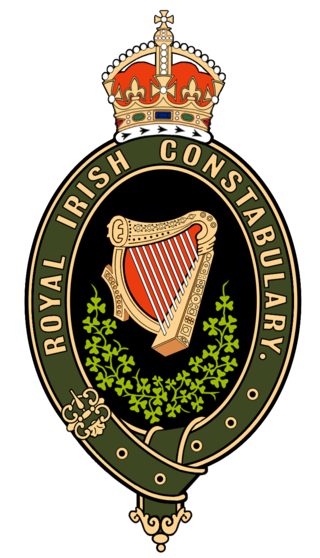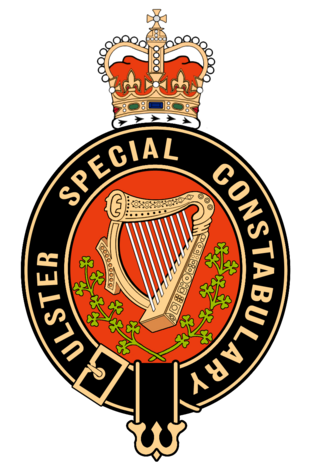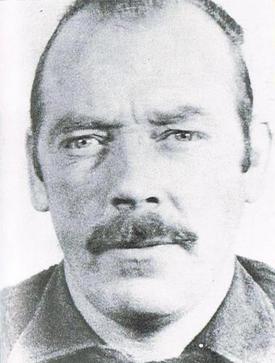Related Research Articles

The Royal Ulster Constabulary (RUC) was the police force in Northern Ireland from 1922 to 2001. It was founded on 1 June 1922 as a successor to the Royal Irish Constabulary (RIC) following the partition of Ireland. At its peak the force had around 8,500 officers, with a further 4,500 who were members of the RUC Reserve.

The Royal Irish Constabulary was the police force in Ireland from 1822 until 1922, when all of the country was part of the United Kingdom. A separate civic police force, the unarmed Dublin Metropolitan Police (DMP), patrolled the capital and parts of County Wicklow, while the cities of Derry and Belfast, originally with their own police forces, later had special divisions within the RIC. For most of its history, the ethnic and religious makeup of the RIC broadly matched that of the Irish population, although Anglo-Irish Protestants were overrepresented among its senior officers.

Terence Marne O'Neill, Baron O'Neill of the Maine, PC (NI), was the fourth prime minister of Northern Ireland and leader (1963–1969) of the Ulster Unionist Party (UUP). A moderate unionist, who sought to reconcile the sectarian divisions in Northern Ireland society, he was a member of the Parliament of Northern Ireland for the Bannside constituency from 1946 until his resignation in January 1970; his successor in the House of Commons of Northern Ireland was Ian Paisley, while control of the UUP also passed to more hard-line elements.

The Ulster Special Constabulary was a quasi-military reserve special constable police force in what would later become Northern Ireland. It was set up in October 1920, shortly before the partition of Ireland. It was an armed corps, organised partially on military lines and called out in times of emergency, such as war or insurgency. It performed this role most notably in the early 1920s during the Irish War of Independence and the 1956-1962 IRA Border Campaign.
The Ulster Defence Regiment (UDR) was an infantry regiment of the British Army established in 1970, with a comparatively short existence ending in 1992. Raised through public appeal, newspaper and television advertisements, their official role was the "defence of life or property in Northern Ireland against armed attack or sabotage" but unlike troops from Great Britain they were never used for "crowd control or riot duties in cities". At the time the UDR was the largest infantry regiment in the British Army, formed with seven battalions plus another four added within two years.

The Irish People's Liberation Organisation was a small Irish socialist republican paramilitary organisation formed in 1986 by disaffected and expelled members of the Irish National Liberation Army (INLA), whose factions coalesced in the aftermath of the supergrass trials. It developed a reputation for intra-republican and sectarian violence as well as criminality, before being forcibly disbanded by the Provisional Irish Republican Army (IRA) in 1992.
The Ulster Protestant Volunteers was a loyalist and Reformed fundamentalist paramilitary group in Northern Ireland. They were active between 1966 and 1969 and closely linked to the Ulster Constitution Defence Committee (UCDC) and Ulster Volunteer Force (UVF), established by Ian Paisley and Noel Doherty in 1966.

The Battle of the Bogside was a large three-day riot that took place from 12 to 14 August 1969 in Derry, Northern Ireland. Thousands of Catholic/Irish nationalist residents of the Bogside district, organised under the Derry Citizens' Defence Association, clashed with the Royal Ulster Constabulary (RUC) and loyalists. It sparked widespread violence elsewhere in Northern Ireland, led to the deployment of British troops, and is often seen as the beginning of the thirty-year conflict known as the Troubles.
Sir Ronald Flanagan is a retired senior Northern Irish police officer. He was the Home Office Chief Inspector of Constabulary for the United Kingdom excluding Scotland. Sir Ronnie was previously the Chief Constable of the Police Service of Northern Ireland (PSNI) since its creation in 2001 to 2002, and had been Chief Constable of its predecessor, the Royal Ulster Constabulary (RUC) until 2001.
Sir Kenneth Leslie Newman was a senior British police officer. He was Chief Constable of the Royal Ulster Constabulary (RUC) from 1976 to 1980, and Commissioner of the Metropolitan Police from 1982 to 1987. He is best known for initiating a major reform and restructure of the Metropolitan Police during his tenure as Commissioner and for seeing the RUC replace the British Army as the dominant security force in Northern Ireland during his tenure as Chief Constable.
The Troubles in Dungiven recounts incidents during, and the effects of the Troubles in Dungiven, County Londonderry, Northern Ireland.

Operation Banner was the operational name for the British Armed Forces' operation in Northern Ireland from 1969 to 2007, as part of the Troubles. It was the longest continuous deployment in British military history. The British Army was initially deployed, at the request of the unionist government of Northern Ireland, in response to the August 1969 riots. Its role was to support the Royal Ulster Constabulary (RUC) and to assert the authority of the British government in Northern Ireland. This involved counter-insurgency and supporting the police in carrying out internal security duties such as guarding key points, mounting checkpoints and patrols, carrying out raids and searches, riot control and bomb disposal. More than 300,000 soldiers served in Operation Banner. At the peak of the operation in the 1970s, about 21,000 British troops were deployed, most of them from Great Britain. As part of the operation, a new locally-recruited regiment was also formed: the Ulster Defence Regiment (UDR).
The Reavey and O'Dowd killings were two co-ordinated gun attacks on 4 January 1976 in County Armagh, Northern Ireland. Six Catholic civilians died after members of the Ulster Volunteer Force (UVF), an Ulster loyalist paramilitary group, broke into their homes and shot them. Three members of the Reavey family were shot at their home in Whitecross and four members of the O'Dowd family were shot at their home in Ballydougan. Two of the Reaveys and three of the O'Dowds were killed outright, with the third Reavey victim dying of brain hemorrhage almost a month later.
The Hunt Report, or the Report of the Advisory Committee on Police in Northern Ireland, was produced by a committee headed by Baron Hunt in 1969. An investigation was performed into the perceived bias in policing in Northern Ireland against Catholics and other unprofessional practices. The Hunt Report was published on 10 October 1969 and proposed removing the military function from the Royal Ulster Constabulary (RUC), the disbandment of the Ulster Special Constabulary, and their replacement of their military function to a new locally-recruited part time force, which became the Ulster Defense Regiment (UDR). Most of the main proposals of the Hunt Report were implemented, and the B-Specials were disbanded in March 1970. The reaction from some in the Unionist community was aggressive. Constable Victor Arbuckle was shot and killed on the day after the publishing of the Hunt Report when the RUC attempted to disperse a crowd of Unionists that had gathered near the Catholic area of Unity Flats. Constable Arbuckle was the first RUC man killed in what became known as the troubles. The killing of Constable Arbuckle was allegedly carried out by members of the Ulster loyalist paramilitary group the Ulster Volunteer Force. Critics would later state that the UDR displayed problems of bias and a difficulty with maintaining a balance of Catholic/Protestant membership, similar to its forerunners.

William Henry Wilson Hanna MM was a high-ranking Ulster loyalist who founded and led the Mid-Ulster Brigade of the Ulster Volunteer Force (UVF) until he was killed, allegedly by Robin Jackson, who took over command of the brigade.
John Oliver Weir is an Ulster loyalist born and raised in the Republic of Ireland. He served as an officer in Northern Ireland's Royal Ulster Constabulary's (RUC) Special Patrol Group (SPG), and was a volunteer in the illegal Ulster Volunteer Force (UVF). As a member of the UVF's Mid-Ulster Brigade led by Robin "the Jackal" Jackson, Weir was a part of the Glenanne gang, a group of loyalist extremists that carried out sectarian attacks mainly in the County Armagh area in the mid-1970s.
Sir Albert Kennedy, KPM was a United Kingdom police officer who was Inspector-General of the Royal Ulster Constabulary from 1961 to 1969.
On 11 August 1970, two Royal Ulster Constabulary (RUC) officers were killed by a booby-trap bomb planted under a car by the Provisional Irish Republican Army (IRA) near Crossmaglen, in County Armagh, Northern Ireland. They were the first RUC officers to be killed by republicans during the Troubles and the first security forces to be killed in South Armagh, an IRA stronghold for much of the conflict.

On 12 December 1993, a unit of the Provisional Irish Republican Army's (IRA) East Tyrone Brigade ambushed a two-men unmarked mobile patrol of the RUC in Fivemiletown, County Tyrone. Two constables were shot and killed instantly. A military helicopter was also fired at by a second IRA unit in the aftermath of the incident, during a follow-up operation launched in the surroundings of the town by both the British Army and the RUC. A number of suspects were questioned, but the perpetrators made good their escape. The action occurred just three days before the Downing Street Declaration.
References
- ↑ Ryder, p. 108
- ↑ Ryder, p. 97
- ↑ Ryder, p. 108
- ↑ Ryder, p. 109
- ↑ Ryder, p. 112
- ↑ Ryder, 115
- ↑ "CAIN: HMSO: Joint Communique by the British and Northern Ireland governments, 9 and 10 October 1969" . Retrieved 5 September 2015.
- ↑ "CAIN: HMSO: Joint Communique by the British and Northern Ireland governments, 9 and 10 October 1969" . Retrieved 5 September 2015.